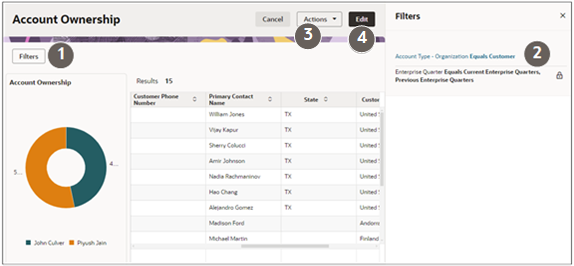Express Report Security
What reports users can access, what actions they can take, and what data those reports contain depends on 3 different levels of security.
Users need:
- Functional privileges to view and use the Express Reports work area itself.
- Access to individual reports.
- Access to the sales data in the reports.
Functional Privileges to View and Take Actions in the Express Reports Work Area
To access and take actions in the Express Report pages, you must provision users with the functional privileges listed in the following table. The appropriate privileges are already included in the job roles provided by Oracle for sales and partner job roles.
| Privilege | Description | Job Roles |
|---|---|---|
|
Manage Express Report Definitions (ORA_ZCA_MANAGE_SRT_REPORT_DEFS_CONFIG_PRIV) |
Create, update, and delete express reports. |
|
|
Manage Express Report Types (ORA_ZCA_MANAGE_SRT_REPORT_TYPES_CONFIG_PRIV) |
Create additional express report types for custom objects using custom subject areas. |
|
|
View Express Report Definitions (ORA_ZCA_VIEW_SRT_REPORT_DEFS_DATA_PRIV) |
View express reports. |
|
|
View Express Report Types (ORA_ZCA_VIEW_SRT_REPORT_TYPES_DATA_PRIV) |
View the express report type classifications for the reports you can view. |
|
Who Can See Which Report and Who Can Share Them
Express reports includes data security which controls if a report can be seen only by the owner or the sales organization as a whole. Who can see which report and who can share them with the organization is controlled by Sales and Service Access Management access groups.
By default, all users can view only the personal reports they create and those that administrators share with the organization. Sales administrators can view and edit all of the reports in the organization, including the personal ones, and share them with the organization as a whole. If a sales manager wants to share a report with the rest of the team, they can ask a sales administrator to share it.
Salespeople can't edit reports that are shared with them. However, the report creators can allow users to select different values for filters in the report by turning on the Prompted option. If a user wants to edit a report, they can always copy it on the list page and edit their own personal copy.
Here's a screenshot of a sample report highlighting the kinds of actions you can take while viewing an express report.
| Callout | Description |
|---|---|
| 1 | When viewing a report, you can display the filters used in the report. |
| 2 | You can edit the filter values for filters that were set up with the Prompted option turned on. Prompted filters show up as links. Filters with this option turned off display a locked icon. |
| 3 | You can export the data in the report to Microsoft Excel or to a .CSV file. |
| 4 |
The Edit button appears only on the express reports you own unless you're an administrator. Administrators can edit all reports and share them with the rest of the organization. |

Who Can See What Data in the Reports Themselves
When you view a report, you see only the sales information that you've permission to view. If the report highlights opportunity revenue, for example, managers may see different data from their reports and their peers. Access to sales data is affected by many factors. These include your position in the sales resource hierarchy and your membership in a sales team or sales territory.